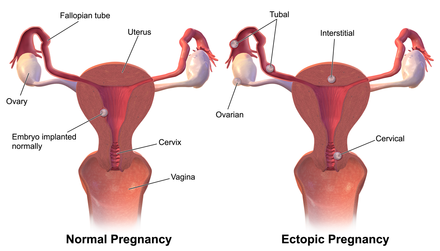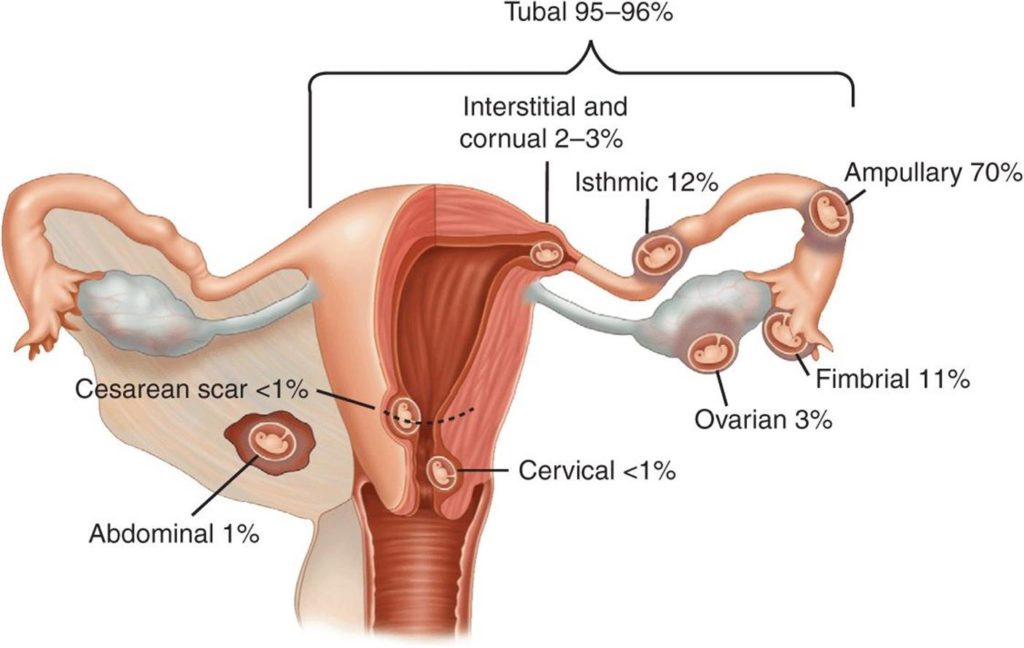An ectopic pregnancy is a pregnancy which is not in the normal place (the womb). Ectopic means ‘misplaced’. It occurs in about 11 in 1,000 pregnancies. Although many ectopic pregnancies are now treated without the need for an operation, you should always see a doctor urgently if you think you have an ectopic pregnancy. Symptoms include lower tummy (abdominal) pain which can become severe. A ruptured ectopic pregnancy is life-threatening, needing emergency surgery.

Understanding normal early pregnancy
An egg (ovum) is released from an ovary into a Fallopian tube. This is called ovulation and usually occurs once a month about halfway between periods. Sperm can survive in the Fallopian tubes for up to five days after you have had sex. A sperm may then combine with the ovum (fertilisation) to make an embryo. The tiny embryo is swept along a Fallopian tube to the womb (uterus) by tiny hairs (cilia). It normally attaches to the inside lining of the uterus and develops into a baby.
Where does an ectopic pregnancy develop?
Most ectopic pregnancies occur when a fertilised egg (ovum) attaches to the inside lining of a Fallopian tube (a tubal ectopic pregnancy).Rarely, an ectopic pregnancy occurs in other places such as in the ovary, the neck of the womb (cervix) or inside the tummy (abdomen). Also rarely, a pregnancy can develop in the womb at the same time as an ectopic pregnancy outside the womb (a heterotopic pregnancy). The rest of this lea_et deals only with tubal ectopic pregnancy.
What are the problems with an ectopic pregnancy?
A tubal ectopic pregnancy never survives. Possible outcomes include the following:
- The pregnancy often dies after a few days. About half of ectopic pregnancies probably end like this. You may have no symptoms and you may never have known that you were pregnant. Sometimes there is slight pain and some vaginal bleeding similar to a miscarriage. Nothing further needs to be done if this occurs.
- The pregnancy may grow for a while in the narrow Fallopian tube. This can stretch the tube and cause symptoms. This is when an ectopic pregnancy is commonly diagnosed.
- The narrow Fallopian tube can only stretch a little. If the pregnancy grows further it will normally split (rupture) the Fallopian tube. This can cause heavy internal bleeding and pain. This is a medical emergency.
Ectopic pregnancy symptoms
Symptoms typically develop around the sixth week of pregnancy. This is about two weeks after a missed period if you have regular periods. However, symptoms may develop at any time between 4 and 10 weeks of pregnancy. You may not be aware thatyou are pregnant. For example, your periods may not be regular, or you may be using contraception and not realise it has failed.
Symptoms can also start about the time a period is due. At first you may think the symptoms are just a late period.
Symptoms include one or more of the following.
- Pain on one side of the lower tummy (abdomen). It may develop sharply, or may slowly get worse over several days. It can become severe.
- Vaginal bleeding often occurs but not always. It is often different to the bleeding of a period. For example, the bleeding may be heavier or lighter than a normal period. The blood may look darker. However, you may think the bleeding is a late period.
- Other symptoms may occur such as diarrhoea, feeling faint, or pain on passing stools. Shoulder-tip pain may develop. This is due to some blood leaking into the abdomen and irritating the muscle used to breathe (the diaphragm).
- You may feel dizzy or faint.
- If the Fallopian tube ruptures and causes internal bleeding, you may develop severe pain or ‘collapse’. This is an emergency as the bleeding is heavy.
- Sometimes there are no warning symptoms (such as pain) before the tube ruptures. Therefore, collapse due to sudden heavy internal bleeding is occasionally the _first sign of an ectopic pregnancy.
Who develops an ectopic pregnancy?
Ectopic pregnancy can occur in any sexually active woman. In the UK there are nearly 12,000 women seen in hospitals with ectopic pregnancies each year.
The chance is higher than average in the following at-risk groups:
If you have already had an ectopic pregnancy you have a slightly higher chance that a future pregnancy will be ectopic.
If you have had two or more ectopic pregnancies then your chances of another ectopic pregnancy are even greater.
If you have damage or other abnormality of a Fallopian tube. This is because a fertilised egg (ovum) may become stuck in the tube more easily.

For example:
If you have had a previous infection of the womb (uterus) or Fallopian tube (pelvic infammatory disease). This is most commonly due to either chlamydia or gonorrhea /TB. These infections can lead to some scarring of the Fallopian tubes.
Previous sterilisation operation. Sterilisation is a very effective method of contraception. However, in the rare event that a pregnancy does occur, it has a higher risk of being ectopic.
Any previous surgery to a Fallopian tube or nearby structures.
If you have a condition causing in ammation of the uterus and surrounding area (endometriosis).
If you use an intrauterine contraceptive device (IUCD). Pregnancy is rare as this is a very effective method of contraception.However, if you become pregnant while using an IUCD, it has a higher chance of being ectopic than if you did not have the IUCD.
If you are using assisted conception (some types of infertility treatments).
However, around one third of women with an ectopic pregnancy do not have any of these risk factors.
How is ectopic pregnancy confirmed?
If you have symptoms that may indicate an ectopic pregnancy you will usually be seen in the hospital immediately.
A urine B-hcgtest can confrm that you are pregnant
An ultrasound scan may con_rm an ectopic pregnancy. This is usually an internal (transvaginal) scan which is not painful and shows good views of the Fallopian tubes. However, the scan may not be clear if the pregnancy is very early. If this is the case then a repeat scan a few days later is often done.
Blood tests that show changes in the level of a pregnancy hormone called human chorionic gonadotrophin (hCG) are also usually done. In a pregnancy which is developing, the hCG levels gradually go up.
Ectopic Pregnancy
DR.P.TULASI USHA, MBBS,MS(OBG)
CONSULTANT OBSTETRICIAN AND GYNECOLOGIST
